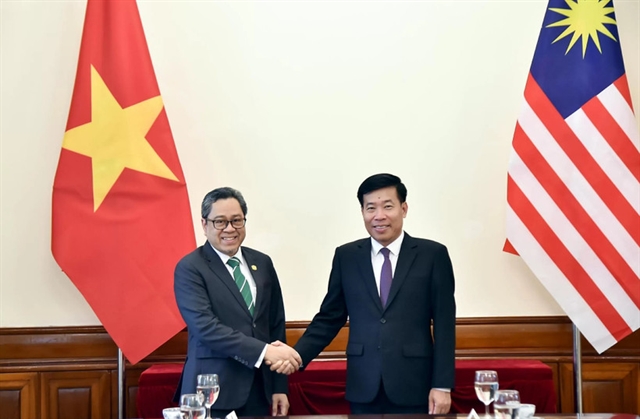 Politics & Law
Politics & Law

 |
| Deputy Foreign Minister Nguyễn Mạnh Cường and Deputy Secretary-General of the Malaysian Ministry of Foreign Affairs Dato’ Ahmad Rozian Abd Ghani at their meeting on August 28 in Hà Nội. |
HÀ NỘI — Deputy Foreign Minister Nguyễn Mạnh Cường and Deputy Secretary-General of the Malaysian Ministry of Foreign Affairs Dato’ Ahmad Rozian Abd Ghani co-chaired the third Việt Nam–Malaysia Senior Officials’ Strategic Dialogue in Hà Nội on Thursday.
Deputy Minister Cường welcomed the timely organisation of the meeting following the elevation of bilateral ties to a Comprehensive Strategic Partnership during the historic visit to Malaysia by Party General Secretary Tô Lâm and his spouse in November 2024. He stressed that the dialogue reflected the proactive efforts of both foreign ministries in implementing the new partnership and the agreements reached by the two countries’ high-ranking leaders. The event was all the more meaningful as it coincided with major national celebrations: Malaysia’s 68th National Day and Việt Nam's 80th August Revolution and National Day.
During the meeting, the two sides reviewed bilateral cooperation and discussed orientations for implementing the Comprehensive Strategic Partnership in line with high-level agreements. They noted with satisfaction that under the Action Programme for 2021–25, and particularly after the recent upgrade in ties, cooperation has deepened and become more effective across multiple fields, including politics, economy–trade–investment, defence–security, labour, culture, education, tourism, and people-to-people exchanges.
Ghani highlighted economic, trade, and investment cooperation as a bright spot in recent years. Malaysia remains Việt Nam's third-largest trading partner in ASEAN and ninth globally, while also ranking among the top 10 foreign investors in Việt Nam. Bilateral trade has steadily increased, approaching the target of $18 billion in a more balanced manner.
Looking ahead, both sides pledged close coordination to soon adopt the Action Programme for implementing their Comprehensive Strategic Partnership for 2026–30. They agreed to promote emerging areas of complementary cooperation such as digital transformation, innovation, artificial intelligence, technology, agriculture and Halal products, energy, and power transmission, and to accelerate the signing of cooperation documents in these fields to establish a solid legal framework for joint activities.
Exchanging views on regional and international developments, the two sides concurred that amid a fast-changing strategic environment fraught with risks and challenges, countries in the region should diversify partnerships, and promote sustainable economic recovery and green growth. At the same time, they underscored the need to enhance coordination within multilateral mechanisms, with ASEAN continuing to play a leading role in fostering the bloc’s resilience and shaping the regional architecture.
Both sides reaffirmed their commitment to building the East Sea (internationally known as the South China Sea) into a sea of peace, cooperation, and development. They agreed to work with other ASEAN members to fully and effectively implement the Declaration on the Conduct of Parties in the East Sea (DOC), thereby facilitating negotiations on a substantive and effective Code of Conduct (COC). They also vowed continued mutual support at multilateral forums, particularly within the United Nations.
Deputy Minister Cường urged Malaysia, as ASEAN Chair in 2025 and country coordinator of ASEAN–China dialogue relations for 2024–27, to maintain strong commitment and leadership in upholding international law, especially the 1982 UN Convention on the Law of the Sea (UNCLOS), and to make positive, constructive, and responsible contributions to the COC negotiation process. — VNA/VNS




